Tags
Related Posts
Share This
Campus Security
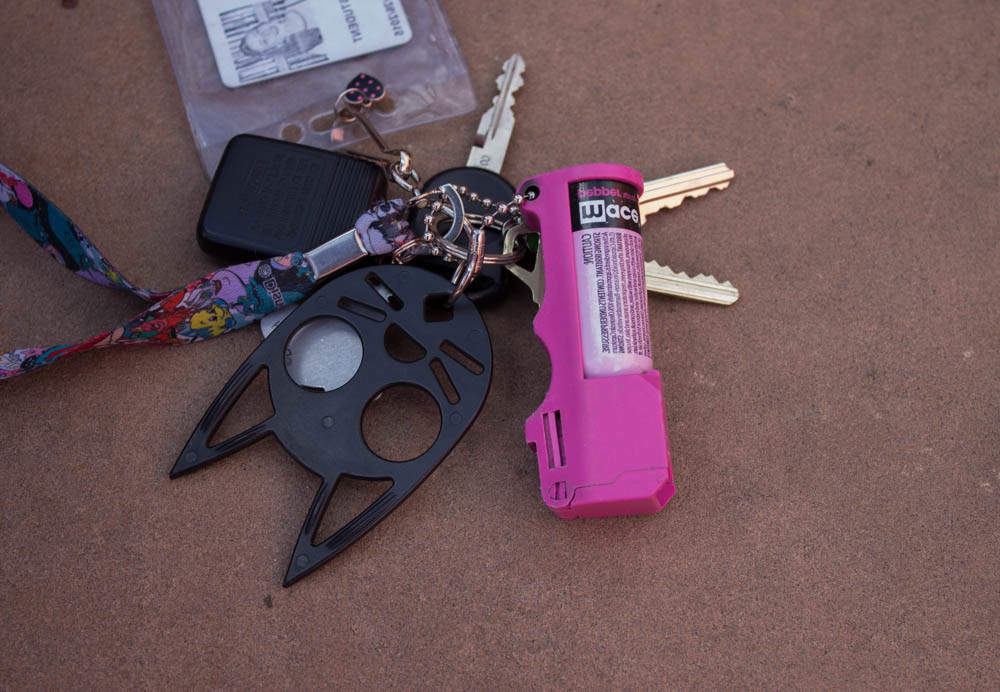
Many students more feel secure having pepper spray on them. Photo by Kyleigh Carter.
Campus security has been a heated topic at SFUAD lately after Head of Security Peter Romero held several meetings with students last month discussing his plans to tighten security protocol. “We had a couple of incidents where Security had been not respected and the rules of the campus had not been respected,” Romero says. “So what I did was take an initiative to do one-on-one dorm hall meetings with all the dorms and I had a really good turn out. I thank the student body for that because I think the majority of the students here are some of the greatest students and artists I’ve ever worked with.”
Despite the general good conduct of SFUAD’s students, there was enough of a concern that Romero felt there was a need to remind students of the rules and regulations on campus with the hope that respect for security guards would improve. One of the major issues that arose at the meeting was the school’s ban on pepper spray, which has launched a campus-wide conversation about what it means to be safe in college. While the ban on pepper spray is being lifted sometime in the next month, students still have concerns related to the policy and other security issues on campus.
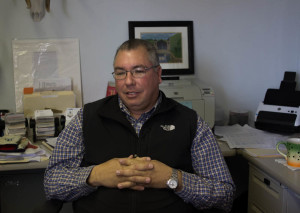
Head of Security, Peter Romero. Photo by Kyleigh Carter.
“The official policy on the books is that pepper spray is not allowed on campus at all, regardless of size,” Romero says, but after talking with several students about the ban, he met with Director of Student Operations Melissa Rudd about allowing students to carry pepper spray on campus. Romero has told anyone who has come in to turn in their pepper spray to hang onto it until the policy has officially changed. While the policy is reviewed, Romero is working with The Outdoorsman of Santa Fe, a local outdoors supply vendor, to offer a SFUAD student discount on pepper spray. “You’ll be able to go in and show your student ID and they will sell you the right size at a student discount,” Romero says.
SFUAD Interim President Maria Puzziferro agrees that if students feel safer on campus with pepper spray that they should be allowed to have it. However, given how serious pepper spray burns can be, she wants to have a pepper spray safety training. “Having pepper spray, you could really hurt someone… we need to have a discussion about how to be a responsible owner of pepper spray…[with] pepper spray, just like [with] any kind of weapon, we have to make sure everyone understands how to use it and when is the right time to use it,” Puzziferro says. More information on the new pepper spray policy will be release from Student Life in the next month.
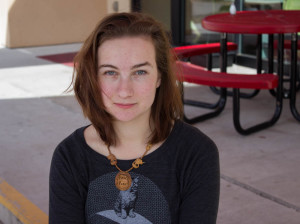
Mariah Duncan. Photo by Kyleigh Carter.
While students are glad they will be allowed to carry pepper spray on campus, they are frustrated with the delay in policy change. Students who commute on and off campus by foot say they feel unsafe without pepper spray. “…At night—because the campus is open—it can be a little scary walking from building to building,” Creative Writing and Literature senior Cris Galvez says. “What I don’t understand is why are we allowed to have [small knives], which can disembowel someone, but we’re not allowed to have pepper spray which is a nonlethal weapon?” Some students feel the change should be immediate as an incident could happen at any time. “If something happens to a student in the next month where pepper spray could helped them, we’ll all be looking at Peter Romero,” says Film sophomore Mariah Duncan. In response, Romero explains that policy changes simply take time. “We’re busy with other projects,” Romero says.
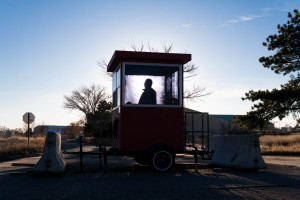
New Security Post at the back entrance. Photo by Whitney Wernick
Pepper spray isn’t the only concern on campus when it comes to security. Students are also concerned about the openness of the campus, especially at the back entrance, where until recently there was no security checkpoint. “There’s just so many ways that people can get on campus,” says sophomore Parker Sean Orr. “We have homeless people wander on campus sometimes. It’s not safe.” Many students feel frustrated that the security gate took more than a year to install and, while they are glad there is a checkpoint there, they still worry over whether it will be properly monitored. “They put that little booth there, but no one’s ever in it,” Orr says.
Students also say the checkpoints aren’t stationed as often as they should be.
“What makes me feel unsafe is when I’ll be driving [onto campus] at night time and there’s no security in the checkpoint, or even when there is someone there and you drive in with someone who [doesn’t have a SFUAD parking sticker]…[Security doesn’t] even ask ‘what are you doing here?’ It’s just kind of sketchy to me because it can be really dangerous. People could just roll in with whatever. I don’t think that [Security is] taking the right precautions to make sure that this campus is safe,” Film major Ashley Crandall says.
Other students say they don’t feel safe or respected by the security guards. Duncan says she and a friend were being followed by a man once as they came onto campus and even though she yelled to a security guard for help, he simply waved at her and didn’t stop the man. While the harasser eventually left the two girls alone, Duncan says the incident made her less trusting of the guards on campus. “I screamed ‘Security!’ and [the guard] just waved it off. I felt very unsafe. I felt like security was siding with the man on campus,” Duncan says.

Film major Ashley Crandall carries pepper spray on her key chain so she feels safer. Photo by Kyleigh Carter.
Crandall said that she also felt disrespected while speaking with Romero at the security meeting. “I had my pepper spray on my keys and I said, ‘I have this. I haven’t used it yet but it makes me feel safer when I walk from my classes at night… Is this acceptable?’ and he said ‘No,’ and so I asked ‘Why?’…and he told me ‘Well, what if you decide to be a bitch and pepper spray your boyfriend in the face?’ ” Crandall was shocked by his response. When asked about the incident, Romero told Jackalope, “As with many things in life hindsight is 20/20. Every human has said things that they wish they could take back. If I could take back what I said I would. I feel bad that she feels that I insulted her. That was never the intent.”
Another student says he’s been disrespected on campus due to racial profiling. Contemporary Music Program major Tulani Mason tells Jackalope that he’s been pulled aside by Security three separate times while walking on campus. “It’s pretty much been almost like a routine for me because it’s happened…every single year,” he says, describing being stopped and asked to show ID. Once, Mason reports he was being pulled aside by Security when he saw a white, female student walking in the other direction. She wasn’t stopped by Security. “Would they stop her because she looks like she belongs [here]?” he asks.
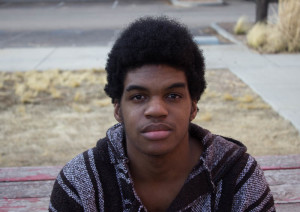
Tulani Mason. Photo by Kyleigh Carter.
After a particular incident last year, Mason was so upset that he went to Security’s office directly to confront them. “All I could do was say my name and I just started crying because at this point this is where I could open up Facebook and see people like me dying and not just people like me dying, but people like me dying of the law. The law was killing me. So every time I opened up Facebook, it felt like ‘You’re a monster and you’re going to be dealt with as a monster’… I feel scared. Why are these people always stopping me?” he asks. When Security explained their reasons for pulling him aside, they expressed that sometimes homeless people find their way on campus, which angered him even more. “That didn’t make me feel good because then they’re comparing me to a hobo…I got a full tuition scholarship here. I’ve been keeping a 3.5 GPA. I’ve been getting As and Bs every semester… I have to believe the school wants me here,” Mason says, but his experiences with Security doesn’t always make him feel that way.
When asked about racial profiling on campus, Romero said that it isn’t what it seems to be. “Profiling can be misconstrued as different things… You can look at it ‘Poor me, poor me. They’re blaming me for everything!’ or you can take personal responsibility because you did have alcohol and you did have drugs. If you’re asked for an ID, it’s probably because they didn’t know who you are,” Romero says. However, Mason explains that he wasn’t carrying anything when he was pulled over. “I was just listening to my music.”
In response to recent allegations, Security is working on making campus a safer place. Romero has some new additions to Security that will be rolling out soon. One of these includes a LiveSafe app that will allow students to do a myriad of things related to campus security. A few features of the app include anonymous reports and tips, virtual escorts and direct contact with campus security. “We are testing it right now… Other campuses are using it… You can do all kinds of things on this app.”
The app also will help students report problems. “What’s really important is that when students see something wrong, they report it,” Puzziferro says. “The LiveSafe app is awesome because people want to report things but want to remain anonymous because they’re just not sure [about reporting something] but sometimes even if it’s something you’re not sure about, you still should report something, which is why I think the anonymous feature is really important.” The LiveSafe app will be released for student and faculty use soon.
Another plan to tighten security Romero is planning is closing the road the goes behind Garson Studios while the studios are closed. “It’s a big shortcut for the community. [I mean] no disrespect to the community, but my job is to keep [students] safe, and when people are flying through here they don’t stop at stop signs and it goes right through the housing area. I feel for the people who live there because we’ve had a lot of near misses,” Romero explains. By closing that road with gates, dangerous drivers won’t be able to get on campus without first checking with security and will also be forced to take a route that contains multiple speed bumps, effectively slowing drivers down.
Romero is working to continue to upgrade Security as the semester progresses. Students are welcome to visit his office in the basement of Alexis to raise concerns or suggest additions to campus that could make where they live and learn. Students can also email Romero at Peter.Romero@santafeuniversity.edu or call him at 505-473-6328. Security’s number is 505-424-5000.






 Jackalope Magazine is the student magazine of Santa Fe University of Art and Design. Building on the interdisciplinary nature of our education, we aim to showcase the talent of our university and character of our city.
Jackalope Magazine is the student magazine of Santa Fe University of Art and Design. Building on the interdisciplinary nature of our education, we aim to showcase the talent of our university and character of our city.
When my daughter enrolled in this school it was said under the security that our children could have personally escort from security to and from their classes especially the night classes and if they were going to their studies after hours to work on a project. What happened? The security was supposed to be up to par at this school. Now I worry about my daughter a thousand times more than i did yesterday. Especially after the Arizona and Colorado dorm shootings last year.
Hello Michelle, I am the Assistant Director of Student Affairs and Operations. I would like to help address some of your concerns. On the campus, we do have 24/7 security coverage provided by several security guards. Students may, at any time, contact security to request an escort.
We will also soon be launching the roll-out of a campus-wide app called LiveSafe, which will allow students to request a security escort directly through the app as well. Students will also have the ability to request that a friend ‘watch them walk’ from one location to another via GPS tracking. We’ll be detailing all of this in an upcoming communication to students and parents. We take our role in providing a safe living and learning environment for students very seriously. If you ever have any additional questions or concerns please don’t hesitate to contact me at 505-473-6176, at jeremy.hadley@santafeuniversity.edu